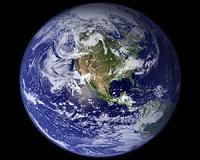| . |  |
. |
Geneva (AFP) June 4, 2010 A leading international environmental alliance on Friday called for a global suspension to oil and gas extraction in ecologically sensitive areas, following the Gulf of Mexico oil disaster. The International Union for the Conservation of Nature (IUCN) said the moratorium should include deepwater ocean sites the industry is increasingly exploring to cope with growing energy demand, despite higher financial and environmental risks. "The technology to minimise the risks and impacts of catastrophes such as the Deepwater Horizon oil spill is obviously lacking at present," said IUCN Director General Julia Marton-Lefevre. "Because our understanding of the impacts of this catastrophe is inadequate we must stop oil and gas exploitation -- not just in deepwater ocean sites but all ecologically sensitive areas, including polar areas," she added. In a statement, the IUCN called "for a global moratorium on oil and gas exploitation in ecologically sensitive areas." It argued that more difficult environments were being exploited, increasing the risk of costly accidents "with a price that is too high both for human livelihoods and the natural systems which support them." The IUCN believes the impact of the oil spill currently swathing the southern US coast is more severe than the 1989 Exxon Valdez spill in Alaska and would spread to Caribbean states, like Mexico, Cuba and the Bahamas, over the coming months. The union groups some 1,000 government and non-governmental nature protection agencies or campaign groups in about 160 countries. It specialises in bringing them together with the United Nations and the corporate sector to develop conservation policy and best practices. The IUCN called on the energy industry to support tightened government regulations and join a search for new economic models and viable technology in the sector. "All energy solutions, even fully renewable energy sources, have environmental consequences, so comprehensive energy strategies need to be urgently developed that take full account of biodiversity and livelihood impacts," said IUCN president Ashok Khosla.
earlier related report As shocking pictures of helpless birds smothered in thick, rust-colored layers of oil emerged, the environmental group the Sierra Club argued too few people are deployed on the ground to help the stricken wildlife. "The scope of this thing is to where it's really unprecedented," Admiral Thad Allen, the official in charge of the US government response to the worst US spill in history, told reporters. He said in a conference call that cleanup workers now have a "battle line" stretching from Louisiana to the Florida panhandle since the oil began spewing into the Gulf in April. He pledged the government would respond to the Sierra Club's complaint that too few rescuers had been deployed to help oiled pelicans, birds and dolphins off the Louisiana coast. Sierra Club Executive Director Michael Brune, who recently toured of an oil-threatened pelican breeding ground off the Louisiana coast in a boat, said he was "struck by the futility of the clean-up effort." Miles of protective boom laid off the Louisiana wetlands only "minimizes" the oil damage to fish and wildlife and the marsh, he said. "We saw a couple of brown pelicans drenched in oil unable to lift themselves out of the water," Brune told AFP, adding an oiled dolphin also appeared to be suffering. Brune said more wildlife rescuers are clearly needed, but he doubts that more boom will do much to stop the surface oil on the fragile wetlands. "The booms only go about 18 inches (0.5 meters) down," Brune said. "I don't think there's enough boom to cover this whole region -- no matter what," he said. "The protection of boom can only go so far." Brune said he and other Sierra Club members on the boat trip saw oil coming in the tide and "lapping" over large portions of protective booms around pelican rookeries in Barataria Bay. "Booms were drenched in oil. Oil just lapped over the booms. There were a couple of brown pelicans drenched in oil. They were trying to fly and they couldn't," he said. The oiled pelicans were not on the boom-encircled island but on the water, among "tens of thousands" of reddish-brown colored "globs" of spilled oil being carried toward the pelican breeding grounds with the morning tide, he said. "Generally, there's no effective way to clean up an oil spill. You can only minimize the damage," said Brune, an environmental activist who has worked on oil spills in coastal Alaska, San Francisco, and the rain forests of northern Ecuador. At least 20 million gallons of crude have spewing into the sea since the Deepwater Horizon drilling rig exploded on April 20, killing 11 workers.
Share This Article With Planet Earth
Related Links Our Polluted World and Cleaning It Up
 World's ecosystems provide 'services' equal to global income
World's ecosystems provide 'services' equal to global incomeNairobi (AFP) June 3, 2010 The world's biodiversity and ecosystems deliver services to humanity estimated to be worth as much as the world gross national income, the UN environment programme (UNEP) said Thursday. In a study released two days before World Environment Day is held in Rwanda, the UN agency warned that two thirds of these ecoystems have already been damaged by humans. "Biodiversity and ecosystems deliv ... read more |
|
| The content herein, unless otherwise known to be public domain, are Copyright 1995-2010 - SpaceDaily. AFP and UPI Wire Stories are copyright Agence France-Presse and United Press International. ESA Portal Reports are copyright European Space Agency. All NASA sourced material is public domain. Additional copyrights may apply in whole or part to other bona fide parties. Advertising does not imply endorsement,agreement or approval of any opinions, statements or information provided by SpaceDaily on any Web page published or hosted by SpaceDaily. Privacy Statement |